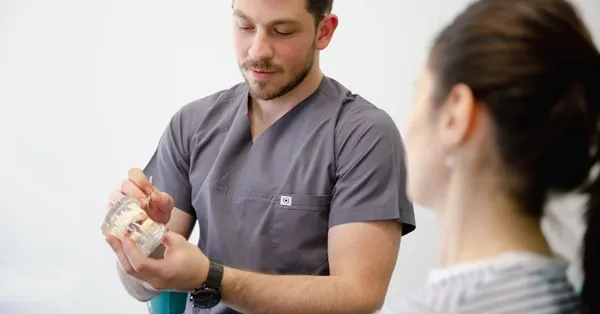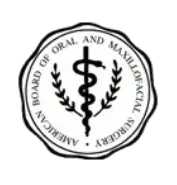A Patient’s Guide to Choosing an Oral Surgeon
A Patient's Guide to Choosing an Oral and Maxillofacial Surgeon
You may need to see an oral surgeon for a variety of issues so understanding how to work with one maybe helpful. To this end, it might be helpful to take a step back and look at how the dental profession is organized. The American Dental Association (ADA) is the world's oldest and largest national dental association. Every dentist that practices within the United States must hold a valid dental license from the ADA.
Oral Surgery, or officially oral and maxillofacial surgery, is one of the nine recognized dental specialties. Graduates of the program, known as oral surgeons, are specialized in the extraction of teeth using a surgical technique (as opposed to a simple extraction). However, oral surgeons are trained in more than just extractions to include IV sedation, facial trauma surgery, corrective jaw surgery as well as bone grafting and dental implant techniques.
General Dentistry vs Oral Surgery
A general dentist establishes the long-term relationship with the patient and is organized to regularly see the patient for six month checkups and cleanings. They are well positioned to spot changes to dental healthy early, thus providing ample time for conservative approaches to fixing the issues and avoiding further complications.. However, sometimes the problem might be more complex or further developed that the general dentist may require more specialized expertise, if the issues involves surgery in or around the dental cavity, then an oral surgeon would be a good choice for referral.
A general dentist establishes the patient's dental home and for complex cases plays an important role in the coordination and sequencing of care.
There are many oral surgeons in the D.C. area. Before choosing one to perform your oral surgery, you should consider several factors. Doing so ensures you can make an informed decision in choosing an oral surgeon you are comfortable with. Consider the tips in this patient guide.
Oral Surgery - a recognized dental specialty
Oral Surgery, or rather officially Oral and Maxillofacial Surgery, is one of the nine recognized specialties recognized by the American Dental Association.
Oral surgeons, like general dentists, complete a four year postgraduate dental school course, however, the surgeons go on and complete an additional 4 years of training usually in a hospital-based residency program. During this residency, aspiring oral surgeons get hands-on experience treating patients and performing a number of complex oral surgery procedures. They are fully trained in oral pathology, anesthesia, oral surgery, and other areas related to the discipline. Officially, they are referred to as oral and maxillofacial surgeons.
Oral and maxillofacial surgeons are trained to assist your general dentist resolve complex surgical issues of the oral cavity. A general dentist establishes the long-term relationship with the patient, and sees the patient regularly for checkups and cleanings - in essence the dental home. An oral surgeon compliments the general dentist by resolving a specific issue, and then refers the patient back to their dental home for maintenance and on-going care. Oral Surgeons are normally not setup to optimize communicating with patients are keeping up with their cleanings.
A good dental home will serve as an early warning system - by identifying teeth that might be showing initial signs of problems that usually can be resolved fairly easily. Waiting until the tooth needs to be extracted are beginning to show signs of en usually will that affect the oral cavity. tMany of the procedures an oral surgeon is trained to do are beyond the scope of a dentist's abilities. That is why you might be referred to an oral surgeon when you visit your dentist for a particular issue.
What Does an Oral Surgeon Do?
Oral surgeons perform many different procedures and treatments, including:
- Tooth extractions - Your dentist can sometimes remove teeth when needed, but more complex extractions, such as wisdom teeth, must be performed by an oral surgeon. A surgeon may also remove teeth that have been severely damaged or infected and can't be treated.
- Dental implants - Another common procedure performed by oral surgeons, dental implants can be used to replace missing or damaged teeth.
- Treatment for facial and jaw injuries resulting from accidents.
- Diagnosis of oral cancer and the removal of tumors.
- Soft tissue, tongue, lip, and tooth surgeries.
- Corrective orthognathic (jaw) surgery.
- Soft and hard tissue grafting.
- Jaw alignment surgeries.
Choosing an Oral Surgeon
The following information will serve as a great patient guide to help you choose a professional and reputable oral surgeon.
1. Education
Oral surgeons need to have completed a residency, but you'll also want to make sure that they went to an accredited dental school. It's also recommended that you choose an oral surgeon who has training and experience with anesthesia as well as oral surgery. Oral surgeons who attend continuing education are also a wise choice, as they will be aware of the latest techniques and methods.
This is especially important if you are having a complex procedure done where outdated methods and technology could be particularly problematic.
2. Experience
While education is certainly important, so is experience. How long has the individual been practicing as an oral surgeon? Do they have a wealth of experience performing the oral surgery you require? Oral surgeons with a lot of experience will typically belong to one or more industry organizations, such as the American Association of Oral and Maxillofacial Surgeons.
3. What Services Do They Offer?
Not every oral surgeon will perform all types of oral surgeries. While almost all of them will perform tooth extractions, not all will handle corrective jaw surgery. Make sure the oral surgeon you are thinking about choosing offers the services you are looking to have done. You might also think about asking for testimonials or before and after pictures as further proof of their experience with a particular type of oral surgery.
4. Payment Methods
Oral surgery typically isn't cheap. And you definitely don't want to choose an oral surgeon simply based on the cost. But you do need to consider payment methods as a factor. Does the oral surgeon take insurance? Are they in-network with your dental or medical plan? Do they offer financing options for payment?
5. Reviews
You can find a wealth of information about a dental practice simply by reading patient reviews on various internet sites. Your dentist may have someone that they recommend, but you should take the time to do your own due diligence as well. It's important to remember that one or two bad reviews are normal, and you shouldn't be swayed by such when the majority of reviews are positive. Examine the practice's ratings as a whole, not just on one or two reviews.
6. Do You Feel Comfortable?
Aside from all of the above, one of the most important factors in choosing an oral surgeon is how comfortable you feel with a particular surgeon. You can speak with a few over the phone or visit the practice in person for a consultation to get a better feel for the surgeon's demeanor. Communication is important - the surgeon should take the time to answer any questions you have and do their best to make you feel at ease.
For professional care and an oral surgeon who takes the time to ensure that you feel comfortable throughout every step of any procedure, contact Oral Surgery DC today.






5 Stars
based on 48 reviews
5 Stars
based on 15 reviews
5 Stars
based on 11 ratings